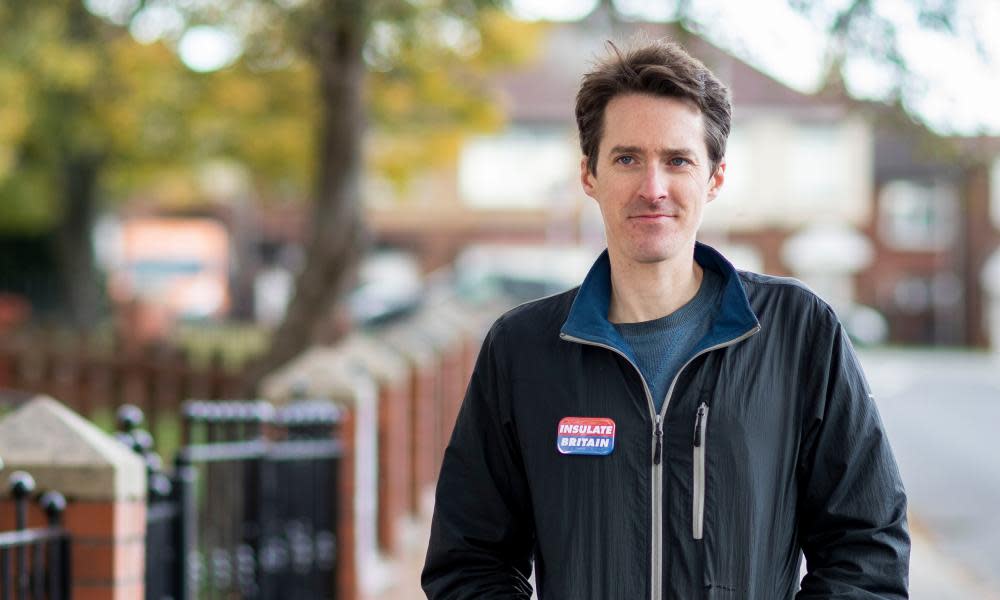Insulate Britain activist jailed for eight weeks for contempt of court

An environmental activist has been jailed for eight weeks after disobeying a judge’s instruction not to mention the climate crisis as his motivation during his trial for taking part in a road-blocking protest.
David Nixon, 36, a care worker from Barnsley, was sentenced at Inner London crown court on Tuesday after admitting contempt of court the day before by using his closing address to begin telling a jury about his reasons for protesting.
He and three others had been on trial for causing a public nuisance by blocking a busy junction in the City of London on 25 October 2021 as part of the Insulate Britain climate campaign. They were found guilty and will be sentenced on 24 March.
The judge, Silas Reid, had told the defendants not to refer to climate change as motivation for their actions, but during his closing speech Nixon turned to the subject of insulation and its relation to climate change.
As Reid directed the jury to leave the court, Nixon said: “That’s before moving on to climate change. Posters around the court building are saying that we are on a highway to climate hell with our foot on the accelerator.
“You’ve not been able to hear these truths because this court has not allowed me to say them. Our safety is at risk, our society is at risk.”
Reid gave Nixon two opportunities on Tuesday to apologise for defying the court, which he refused.
Nixon, who represented himself, told Reid he had found the inability to tell the jury why he had taken part in the protest “soul-destroying”.
“It may not seem like it at the moment but I am at peace with my decisions, [despite] the consequences,” he said. “I’m in your hands basically, but I think for me this moment is something that you are going to have to reflect on in the future.
“If London continues to flood, [if there are more] wildfires, 40C heat, these are decisions that you are having to live with and I – this is going to sound completely unapologetic – I have seen what’s happened in the past week. It underlines climate delay and climate action delay. If we were able to say why we did what we did to the jury they would maybe acquit us.”
Nixon said he had gone through all other possible legal means to try to persuade people of the need for action over climate change before turning to civil disobedience as a last resort.
“When I was a care worker sometimes the young people put themselves in a position where they were not safe and me as a care worker would have to intervene and they wouldn’t like that and they would tell me to F off,” he said.
“Sometimes I had intervene to keep them safe and I see very much sitting in the road in similarity to that. And I know I’m annoying people and it’s not a nice process but ultimately I’m trying to keep people safe. I see what I did yesterday in similar terms.”
”The rule of law would not survive the consequences of climate breakdown and by not taking that into account, judges were failing in their function to keep people safe, Nixon said. “I don’t mean to disrespect the court, or maybe I do mean to disrespect the court because the court is disrespecting itself. It’s not upholding what it is there to uphold,” he said.
“If I was able to speak truth to fellow members of society, I’m putting myself in their hands to make the decisions to do what I think is right. At the moment it feels like I’m putting myself in your hands. I see myself as a good member of society, a good person, who doesn’t know what to do.”
Passing sentence, Reid said: “During the trial I ruled you could not give evidence of your motivations for your actions, and could not refer, except in a very limited way, to climate change and the cost of living crisis.”
He told Nixon the criminal courts were solely there to establish whether the prosecution had proven the guilt of defendants. “You said the court is not upholding what it is there to uphold,” he said. “You were wrong about that. This court is here to determine whether people have committed crimes.”
By defying his orders about what could be mentioned in court, Nixon had put that function in jeopardy and created a risk that the trial would have to be repeated, Reid said.
“Your contempt … is very serious because it represents a complete disrespect for the court and the court process,” he said. “You compounded the initial contempt by continuing to speak … I find it hard to think of a more calculated and deliberate contempt.”
Reid said he had reduced the sentence he would otherwise have given by a third because Nixon had pleaded guilty at the earliest opportunity.
A spokesperson for Insulate Britain said locking people up for “telling the truth in court” was the “mark of an extreme authoritarian regime”.
“We declare that the British legal system no longer has legitimacy in our eyes,” they said. “The courts will continue to be a site of nonviolent civil resistance for as long as it takes for the judiciary to do what is right. This means refusing to criminalise peaceful members of the public who are desperately trying to save lives and prevent the loss of our pensions, our economy, our NHS, the very fabric of our society and everything we hold dear.”

 Yahoo Movies
Yahoo Movies 
